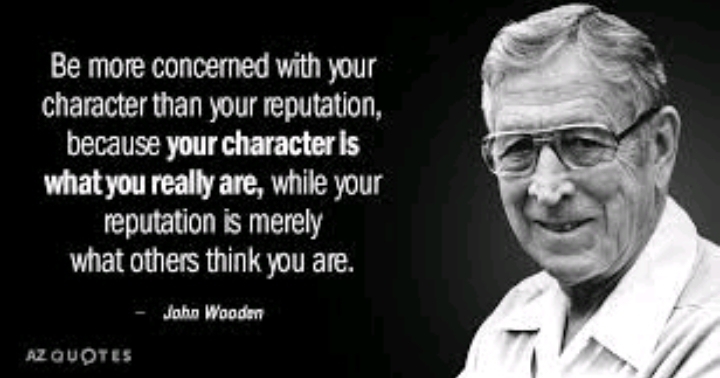In the complex tapestry of human interactions, a distinct yet often misunderstood dichotomy exists between two essential elements that shape how we are perceived and remembered: “Reputation and Character”. While these terms may seem synonymous at first glance, a closer examination reveals their divergent natures. Reputation is the reflection of how others perceive us, often based on our actions, achievements, or external image. While character defines who we truly are.
Sometimes ago, a man named Johnson lived in a rural town. He was known throughout the community for his impeccable reputation, but little did people realize the difference between reputation and character until a fateful day that would change everything.

Mr Johnson was a successful local businessman who ran a thriving store. He was known for his generosity. Whenever someone needed help, he was always there to lend a hand. He sponsored local events, supported charities, and was loved by everyone in town. People admired him and spoke highly of his reputation.
However, there was more to Johnson than just his reputation. He had a hidden side that he kept concealed from the public eye. Behind closed doors, he was manipulative and deceitful. He would exploit his employees, paying them less than they deserved and overworking them without any consideration for their well-being. He had cheated on his taxes for years.
Read Also: Mixing Different Categories of Offenders Behind Bars: The Urgent Case for Prison Reform.
One day, a young journalist wanted to write a feature article about the town’s most reputable figure – Johnson. Intrigued by the glowing reports and admiration she received; she decided to delve deeper into his life to uncover the truth about his character.
The young journalist discovered the stark contrast between Johnson’s reputation and his true character as she began her investigation. She interviewed former employees, who tearfully shared their stories of mistreatment and exploitation. She dug into public records and found evidence of his tax evasion, which had deprived the town of much-needed resources for its growth and development.

The journalist faced a dilemma. On one hand, she could write a piece that perpetuated the illusion of Johnson’s flawless reputation, which would likely be met with praise and appreciation from the community. On the other hand, she could expose the truth about his character, knowing that it might shatter the image people held of him.
After much reflection, she decided to pursue the truth. She believed that the public deserved to know the real Johnson, not just the facade he presented to the world. She wrote a detailed and compelling article that highlighted the difference between reputation and character, using Johnson as a prime example.
The article was published in the town’s newspaper, and at first, there was a mix of disbelief and anger among the townspeople. Some refused to believe that their beloved Johnson could be anything other than the man they thought he was. However, as more evidence came to light, it became increasingly difficult to ignore the truth.
Read Also: The Incursion of Political Merchants in Nigeria Politics
As the dust settled, the town experienced a transformation. People began to understand that reputation is often just a reflection of how others perceive us, while the character is who we truly are when no one is watching. Johnson’s reputation was tarnished, but it opened the door for conversations about generosity and the importance of true character in a person’s life.
Despite the initial shock, the town learned the valuable lesson that reputations can be deceiving, but character defines a person’s true worth. As for Johnson, he had the opportunity to reflect on his actions and make amends. He chose the path of redemption, seeking forgiveness from those he had wronged and committing to change his ways. Though his reputation was forever altered, he began to rebuild his character, understanding that true change came from within.
This tale of Johnson is a timeless reminder to the public that there is indeed a profound difference between reputation and character. The former can be constructed through words and deeds, but the latter is the essence of a person’s soul – a treasure that must never be compromised or undervalued.

In every sector of Nigerian society, one can discern a striking interplay between reputation and character, reputation holds immense significance – it defines how individuals are believed to be, valued, and perceived by others. It is the social currency that often governs interactions, driving individuals to uphold appearances, project success, and seek validation in the eyes of their peers and society at large.
However, within the heart of every individual lies their character – the essence of who they truly are, their real worth. Unlike reputation, which can be shaped and manipulated to varying degrees, the character remains steadfast and unyielding, reflecting the core values and principles that guide one’s actions and decisions. It is the authenticity of character that stands the test of time, shaping the legacy an individual leaves behind.
In Nigerian society, the pursuit of a positive reputation, often fueled by societal expectations and the desire for recognition, can drive individuals to engage in actions that may not align with their true character. This can manifest in situations where appearances are prioritized over substance, and temporary gains are sought at the expense of long-term integrity.
Read Also: Transform Nigerian Local Councils into Agric Development Centres to Enhance Productivity
Furthermore, the complexity of Nigerian society and societal pressures may lead individuals to adopt behaviours that maintain a positive reputation on the surface, even if it diverges from their genuine character beneath. Nevertheless, it is essential to recognize that this distinction between reputation and character is not unique to Nigerians but is a universal aspect of human nature. The allure of a favourable reputation can tempt individuals worldwide to prioritize external appearances over inner truths.
However, acknowledging this distinction can empower all individuals, to embrace the authenticity of their character, fostering a society built on genuine values, trust, and moral fortitude. By acknowledging that character is the anchor that grounds reputation, individuals can strive to align their actions with their true selves, thus building a society that not only values the external perception but treasures the intrinsic worth of its people.

While reputation may carry immediate value and social significance, it is the character that defines a person’s true worth and leaves a lasting impact. As Nigerians navigate the intricate tapestry of societal interactions, understanding and nurturing the authenticity of character can lead to a more compassionate, ethical, and harmonious society that thrives on genuine values and integrity.
It is true that a man may have a good reputation but possess a flawed character, just as someone may have a less favourable reputation despite possessing admirable character traits. We often form our initial opinions of individuals based on their external appearances and actions, which contribute to their reputation. However, as we delve deeper into knowing someone, we uncover the essence of their character – the qualities that define their true worth.
Acknowledging that most individuals are concerned about their reputation is an important aspect of human behaviour. It is only natural to desire positive regard and respect from others. However, placing an excessive focus on reputation at the expense of nurturing one’s character can lead to a misalignment between the two. To truly thrive as individuals and contribute positively to society, it is vital to strike a balance between the two realms.
While it is tempting to prioritize reputation, we must not neglect the significance of character. A strong and virtuous character serves as the foundation upon which a person’s reputation is built. It guides one’s decisions and actions, influencing how they interact with others and leaving a lasting impact on their community.
Therefore, placing equal importance on reputation and character is essential. Cultivating an authentic and ethical character should be a primary focus, as it serves as a guiding compass for one’s actions and decisions. When we are satisfied that our character is above reproach, our reputation will naturally reflect the truth of who we are.
The relationship between reputation and character is intertwined. While reputation may be the initial perception formed by others, it is the character that sustains and defines a person’s true worth. Striving for authenticity in character should be a priority, as it ensures that one’s reputation aligns with their genuine self. Emphasizing the importance of nurturing a strong and virtuous character will lead to a more balanced and fulfilling life, where both reputation and character thrive in harmony.
Read Also: The Future of Nigeria Without Petroleum Subsidy
As the wise adage goes, “Law controls the lesser man; right conduct controls the great one.” This sentiment holds a timeless truth that transcends generations and cultures. In our pursuit of a more virtuous and compassionate society, we must champion the cultivation of strong character, for it is in human nature’s best form that we find the beacon of moral guidance and the conscience of society.
In the realm of governance and legal frameworks, laws serve as essential tools to maintain order, protect rights, and enforce justice. However, even the most comprehensive legal systems have their limitations. Laws can only establish boundaries and consequences, but they cannot instil virtue or inspire goodwill. It is through the embodiment of right conduct and the nurturing of character that we can elevate our interactions beyond mere compliance with laws, and instead foster a culture of empathy, integrity, and mutual respect.

To build a society where right conduct flourishes, it is vital to invest in character education from an early age. Schools, families, and communities must collaborate to instil values, empathy, and integrity in the younger generation. Encouraging empathy towards others, teaching the importance of honesty and responsibility, and promoting acts of kindness can shape individuals who will eventually become the pillars of a compassionate society.
Read Also: 2023 Population Census: A Necessity for Addressing Nigeria’s Problems
Additionally, leaders in all spheres of life, be it politics, business, or academia, must exemplify the principles of right conduct and character. By leading through their actions, they set a powerful example for others to emulate. This can create a ripple effect that permeates the fabric of society, fostering a culture where individuals strive to uphold the right conduct, not merely out of legal obligation, but because it aligns with their core values and sense of responsibility towards their fellow human beings.
As we endeavour to create a society guided by justice, compassion, and ethical conduct, we must recognize that laws alone cannot suffice. To truly shape a better world, we must emphasize character development and the right conduct. Men and women of character, who embody the best of human nature, serve as the conscience of society, guiding us towards a brighter future. It is through the cultivation of strong character and the embodiment of right conduct that we elevate ourselves beyond mere compliance with legal statutes.
By nurturing these qualities in ourselves and future generations, we pave the way for a brighter future where the true essence of human nature shines through. When we stand resolute in knowing that our character is above reproach, we free ourselves from worrying about our reputation. Instead, we can focus on fostering our inner virtues, knowing that a strong and honourable character will invariably guide our actions and leave an indelible mark on the world.
Thus, let us endeavour to prioritize the cultivation of our character over the ephemeral allure of reputation, for it is in the nurturing of our true selves that we find the genuine fulfilment that transcends fleeting perceptions. As we tread the path of life, may we become beacons of integrity, illuminating the way for others to embrace the beauty of character over reputation and discover the timeless wisdom that lies within each of us.
Idowu E. Faleye, a certified Data Analyst, Political Activist, and writer, is a graduate of Politics & Public Administration. He’s the Founder/Chief Data Officer at EphraimHill Data Blog –a Data Reporting Site that is niche in Politics & Society. He can be reached at +2348132100608. or ephraimhill01@gmail.com












































![The Trend of Insecurity in Nigeria. [Part 2]](https://ephraimhilldc.com/wp-content/uploads/2024/09/Computer-Monitoring-of-Remote-areas.png)


































